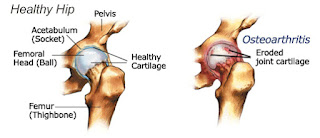5 Risk Factors for Hip Arthritis
The hip is one of the most vulnerable joints in the body to develop arthritis—particularly osteoarthritis. The lifetime risk for hip osteoarthritis is about 1 in 5 for men and 1 in 4 for women, according to the Centers for Disease Control and Prevention (CDC).
How do you know if you're one of the people at risk for hip osteoarthritis? There are several factors that can put you at higher risk.
During our lifetimes, our hips carry most of our weight each day, which can be very hard on the cartilage in the joints. Inevitably, joint cartilage degrades more and more as we age, with the potential to become full-blown osteoarthritis after age 45. Most people with hip osteoarthritis problems are in their 60s and 70s.
Being overweight
Being a woman
Women are more prone to hip osteoarthritis than men. In fact, they are at greater risk for all types of osteoarthritis. Experts think this may be because of maternal genetic risks, how female hormones interact with joint cartilage, and the fact that women are more likely than men to be obese.
Having family members with arthritis
Up to half of all cases of hip arthritis may be related to inherited genetics, whether that is a family member with osteoarthritis or simply having genes for poor bone health or hip alignment, which eventually leads to arthritis.
Having past hip trauma
If you've had a hip injury or hip surgery, this raises your future risk for osteoarthritis.
But even if you're a woman in your 60s with a few extra pounds and a history of hip trauma, there are no guarantees that you will be troubled by hip osteoarthritis. Conversely, someone with none of the risk factors could develop it. Despite identifying these risk factors, experts don't know for sure what causes osteoarthritis.
Being older
During our lifetimes, our hips carry most of our weight each day, which can be very hard on the cartilage in the joints. Inevitably, joint cartilage degrades more and more as we age, with the potential to become full-blown osteoarthritis after age 45. Most people with hip osteoarthritis problems are in their 60s and 70s.
Being overweight
The more you weigh, the more pressure is on your joints—and the faster potential degeneration can occur. Unfortunately, joint pain can discourage people from being active, making the accumulation of more pounds likely. If you have hip arthritis and some extra weight, talk with your doctor, chiropractor or a physical therapist about ways to remain active without triggering joint pain.
Being a womanWomen are more prone to hip osteoarthritis than men. In fact, they are at greater risk for all types of osteoarthritis. Experts think this may be because of maternal genetic risks, how female hormones interact with joint cartilage, and the fact that women are more likely than men to be obese.
Having family members with arthritis
Up to half of all cases of hip arthritis may be related to inherited genetics, whether that is a family member with osteoarthritis or simply having genes for poor bone health or hip alignment, which eventually leads to arthritis.
If you've had a hip injury or hip surgery, this raises your future risk for osteoarthritis.
But even if you're a woman in your 60s with a few extra pounds and a history of hip trauma, there are no guarantees that you will be troubled by hip osteoarthritis. Conversely, someone with none of the risk factors could develop it. Despite identifying these risk factors, experts don't know for sure what causes osteoarthritis.
Regardless of your risk level, it's important to brush up on your knowledge of the symptoms of hip osteoarthritis, because early treatment can slow progress of the disease.




Comments
Post a Comment